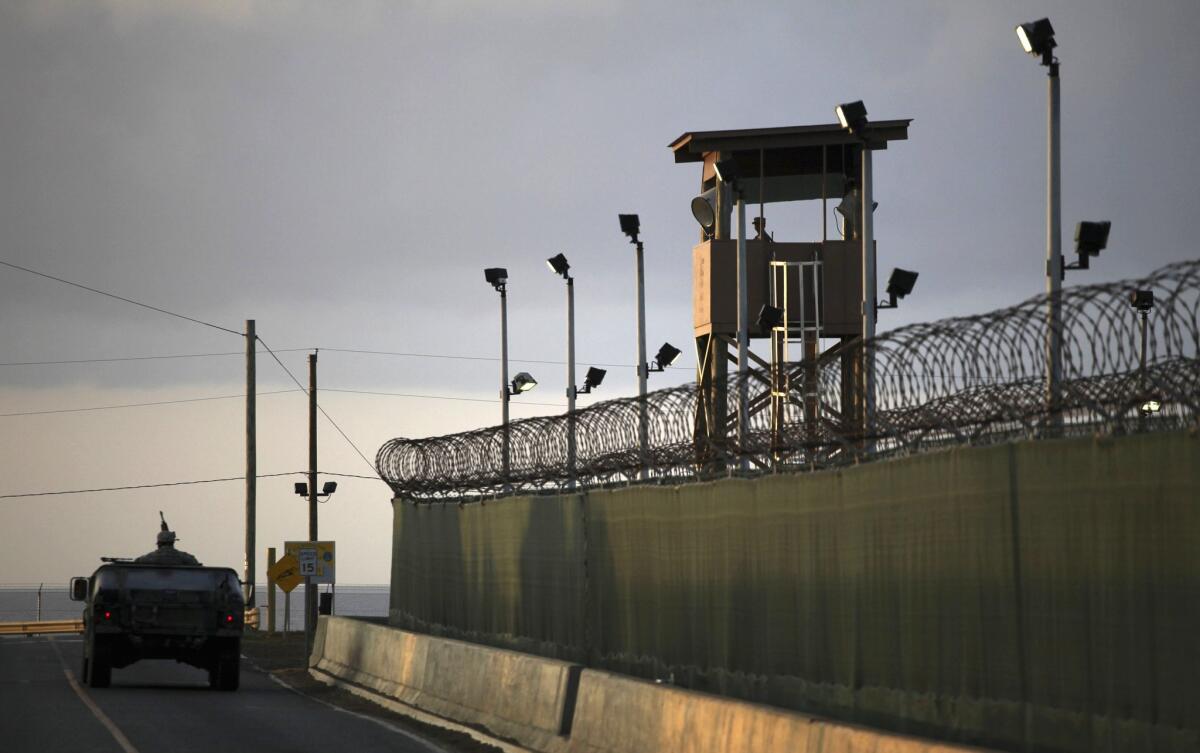White House tells Pentagon to find a cheaper way to shut Guantanamo Bay prison

The White House has decided that a Pentagon plan to close the U.S. prison at Guantanamo Bay, Cuba, shown in a file photo, is too expensive.
- Share via
Reporting from Washington — The White House has rejected the Pentagon’s initial $500-million plan to shutter Guantanamo Bay prison as too costly, ordering military officials to find a cheaper way to move dozens of detainees to the U.S., according to three government officials familiar with the plan.
The Pentagon’s “internal review plan” estimated it would cost more than half a billion dollars to set up and begin operating separate holding facilities for about 90 or fewer detainees in areas next to or adjacent with existing federal prisons in the U.S., said the officials, who were not authorized to speak publicly about the plan.
Two officials, one inside the administration and another at the Defense Department, said the White House is worried the Pentagon’s original plan will face steep opposition in the Republican-led Congress. Many on Capitol Hill on both sides of the aisle want the detention facility and its prisoners to remain in Cuba.
Lawmakers have repeatedly passed legislation that prohibits funding for the transfer of any Guantanamo Bay detainees to the U.S.
“The administration continues to work diligently on completing the plan to safely and responsibly close the detention facility at Guantanamo Bay,” Department of Defense spokesman Cmdr. Gary Ross said Wednesday.
“We are currently working to refine additional cost estimates for different aspects of detainee operations. While we don’t have a specific time line, the plan will be delivered to Congress as soon as it is complete.”
A White House official said only that “the president has consistently spoken of his goal to work with Congress to shutter the facility, and the plan will be submitted as part of that effort.”
The White House’s long-awaited proposal to close Guantanamo had been expected to be presented to Congress by the end of this year, but it has been delayed over cost concerns.
One possible way to bring down the price tag might be to scale back plans to construct a new military prison in the U.S. specially to house the Guantanamo detainees, the officials said, and instead house them in existing military prisons, such as the one at Ft. Leavenworth, Kan.
Obama, in one of his first official acts as president, signed an executive order to close the prison within a year, hoping to make good on a campaign pledge. He continues to argue that keeping it open on the Cuban shoreline only serves to recruit terrorists and encourage future attacks against the U.S.
The prison was set up in early 2002 by the George W. Bush administration to house terrorism suspects swept up by U.S. forces during the wars in Iraq and Afghanistan. Since then, many human rights organizations have demanded it be shut down.
Obama has reduced the Guantanamo prisoner population from 241 to 107 during his first seven years in office. About 50 of those left have been cleared for release to other countries; the remainder are deemed too dangerous to release or transfer.
Recently Obama said he expected the number of detainees would go below 100 in 2016. The prison to date has cost a total of $5.2 billion to operate and maintain. At one point it held a high of 780 prisoners.
“It’s time to close it,” Obama said in October. “It is outdated, it’s expensive; it’s been there for years. And we can do better in terms of keeping our people safe.”
Government officials, speaking confidentially because nothing has been finalized, said Defense department officials have visited three federal prisons in Kansas, Colorado and South Carolina as potential sites to hold terrorism detainees.
The White House has been waiting for feedback from the Defense site committee, even as local authorities, such as Republican Gov. Sam Brownback in Kansas, have vowed to fight any attempt to move detainees into their communities.
The assessment teams have met with facility staff and weighed security, housing for guards and other needs if the detainees were transferred.
A small number of extremely high-value prisoners, such as Khalid Shaikh Mohammed and four other alleged Sept. 11, 2001, terrorist attack plotters, would presumably remain on Guantanamo Bay until they are tried in military tribunals there. The Mohammed conspiracy trial has been locked for years in pretrial hearings, with no trial date in sight.
On Twitter: @RickSerranoLAT
Times staff writer W.J. Hennigan contributed to this report.
More to Read
Sign up for Essential California
The most important California stories and recommendations in your inbox every morning.
You may occasionally receive promotional content from the Los Angeles Times.














